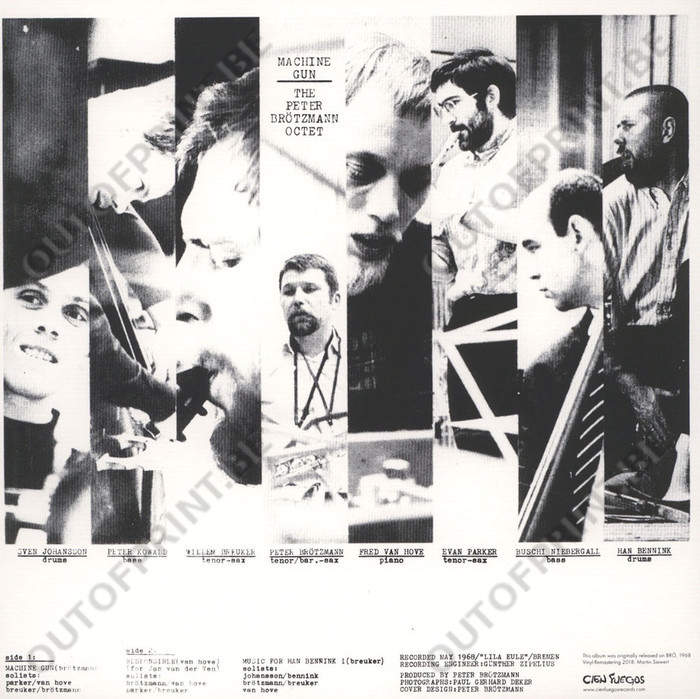

Albert Mangelsdorff on, for example, The Berlin concert), this lasted until the mid-1970s though Brötzmann and Bennink continued to play and record as a duo, and in other combinations, after this time. As a trio, and augmented with other musicians who could stand the pace (e.g. He also began to work more regularly with Dutch musicians, forming a trio briefly with Willem Breuker and Han Bennink before the long-lasting group with Han Bennink and Fred Van Hove. Following the self-production of his first two LPs, For Adolphe Sax and Machine gun for his private label, BRÖ, a recording for Manfred Eicher's 'Jazz by Post' (JAPO), and a number of concert recordings with different sized groups, Brötzmann worked with Jost Gebers and started the FMP label. The trio of Peter Brötzmann, Peter Kowald and Sven-Ake Johansson began playing in 1965/66 and it was a combination of this and the Schoof/Schlippenbach Quintet that gave rise to the first Globe Unity Orchestra. In the mid 1960s, he played with American musicians such as Don Cherry and Steve Lacy and, following a sojourn in Paris with Don Cherry, returned to Germany for his unorthodox approach to be accepted by local musicians like Alex von Schlippenbach and Manfred Schoof. while experiencing freedoms from a different perspective via Stockhausen, Nam June Paik, David Tudor and John Cage.

During 1962/63 Brötzmann, Kowald and various drummers played regularly - Mingus, Ornette Coleman, etc. Self-taught on clarinets, he soon moved to saxophones and began playing swing/bebop, before meeting Peter Kowald. In late 2005 he had a major retrospective exhibition jointly with Han Bennink - two separate buildings separated by an inter-connecting glass corridor - in Brötzmann's home town of Remscheid. Being very dissatisfied with the gallery/exhibition situation in art he found greater satisfaction playing with semi-professional musicians, though continued to paint (as well as retaining a level of control over his own records, particularly in record sleeve/CD booklet design). Peter Brötzmann's early interest was in painting and he attended the art academy in Wuppertal.
Peter brotzmann octe free#
If there is one Peter Brotzmann record to own, this is it if there is one European free jazz record to own, this it."Born Remscheid, Germany on 6 March 1941 soprano, alto, tenor, baritone and bass saxophones, a-clarinet, e-flat clarinet bass clarinet, tarogato. Originally released on Brotzmann's own Brö imprint, Cien Fuegos has remastered the original album and lovingly presented it here on this limited, 180 gram reissue. The octet is rounded out by several other players who would form the foundation of the European free avant-garde: Fred Van Hove, Peter Kowald, Sven Ake-Johansson, and Buschi Niebergall. One of two drummers in the group, Han Bennink loudly declares his intent to push free percussion in a direction unique from his American counterparts, Murray, Graves, and Ali. There are even hummable themes, however brief they may be. Machine Gun is not all volume, though: there are passages of silence and chilling hints of space between barrages of instrumental fury. Noise artists for generations to come would give everything to be half this abrasive. Even today, so many years after this was captured to tape, it's still startling, and still brings to question any ideas you might have about what could be considered "jazz." Yes, American fire music players had broken countless barriers earlier in the 1960s, but nobody had ever really sounded like this before. Machine Gun opens with a deafening blast of pure sound, a pummeling broadside of Brotzmann, Evan Parker, and Willem Breuker's saxophones.

Peter Brotzmann's second release as a leader, this was the album that firmly established his voice as a performer and an improviser, defined what would become the FMP aesthetic, and truly distinguished European free-music from its American counterpart.

2018 marks the 50th anniversary of Machine Gun's release, but it's still just as shocking and powerful a record as ever, a stunning and bewildering listen from beginning to end.


 0 kommentar(er)
0 kommentar(er)
